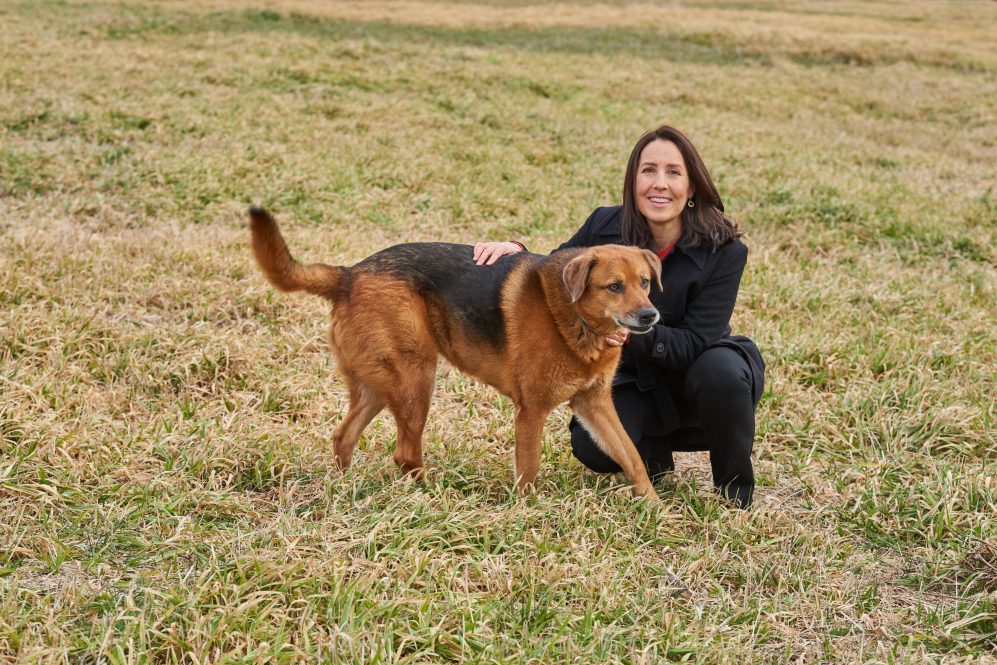In 2016, a new statute known as Desmond’s Law took effect in Connecticut. Named for an abused shelter dog, Desmond’s Law allows courts to appoint legal advocates in animal cruelty cases.
It was the first law of its kind in the country, and allows supervised law students to serve in this capacity. The law also allows lawyers working pro bono to act as advocates.
Soon after Desmond’s Law took effect, UConn School of Law Professor Jessica Rubin established the Animal Law Clinic.
Each semester, four students participate in the clinic and gain real-world litigation experience. These students have diverse backgrounds, with many having majored in fields like animal science, biology, food science, medicine, and public health as undergraduates.
“The work provides remarkable opportunities for students to apply their experience and knowledge in ways many never thought would be possible in law school,” Rubin says.
Students handle, on average, three state court cases per semester. The clinic has also brought suits in federal court.
Advocates assist by providing factual information and legal analyses to help courts manage and adjudicate cases, often finding creative solutions to achieve justice.
The work provides remarkable opportunities for students to apply their experience and knowledge in ways many never thought would be possible in law school — Jessica Rubin
“Animal cruelty cases are complex,” Rubin says. “Animal victims are technically considered property, but since they are living, sentient beings, the cases present varied and challenging issues. Having an advocate in the courtroom is a helpful, free resource.”
Rubin is now working on a research project, funded through a $137,000 grant from the Brooks Institute for Animal Rights Law and Policy, to evaluate the impact of Desmond’s Law and support other states looking to implement similar laws.
Rubin will analyze data from cases before and after the law took effect. She will look at case outcomes such as court-ordered counseling, surrender of animals, protective orders, diversionary programs, incarceration, probation, restitution, and community service.
The work of the clinic is being enhanced by the recent arrival of Tara Cooley as a teaching fellow. Cooley received her LL.M. in Animal Law from Lewis and Clark Law School.
Cooley will help train and supervise students in the clinic. She will also work on the creation of a multi-state advocates’ guide and a pilot diversionary program aimed at treating cruelty offenders.
“I am thrilled to be working with Professor Rubin in the clinic,” Cooley says. “She implemented the first program of its kind, which is needed, not only in Connecticut, but in cruelty cases across the country.”
Rubin’s project also includes the creation of a multi-state manual to enable attorneys in other states to serve as advocates in these cases. The manual will include state-specific information and will provide information and guidance to support states looking to implement similar laws.
Maine passed its own version of Desmond’s Law, which took effect in Jan. 2020, and several other states have proposed legislation. Rubin and Cooley are working with personnel in Maine to support implementation of their law.
“The multi-state guide will be a helpful tool to any state seeking to implement its own courtroom advocate program,” Cooley says.
The third aspect of Rubin’s project is the creation of a pilot diversionary program for offenders. Rubin is working with social workers to develop a program to diagnose and treat offenders. Diversionary programs are designed to help offenders address and rehabilitate the behavior that caused the offense.
In recent years, the discussion over what should happen to animal cruelty offenders has been shifting to include more creative, rehabilitative approaches for nonviolent offenders.
“This is our chance to come up with something that addresses that concern,” Cooley says. “This is our chance to get something out there and see how it works.”
Even without beginning the research yet, Rubin says she has witnessed the positive impacts that advocates are making in animal cruelty cases. For example, advocates can help ensure the victim animal is surrendered if it is alive, or that the court orders the defendant not to have any contact with animals from the start of the case.
Rubin says when the law first took effect, she often had to explain the role of clinic advocates to court personnel. Now, courts expect their presence and appoint them in cases.
“That is an exciting development in just a few years,” Rubin says. “In the legal field, change happens slowly and gradually, so I remind myself and students to be patient and we will achieve good, gradually.”



